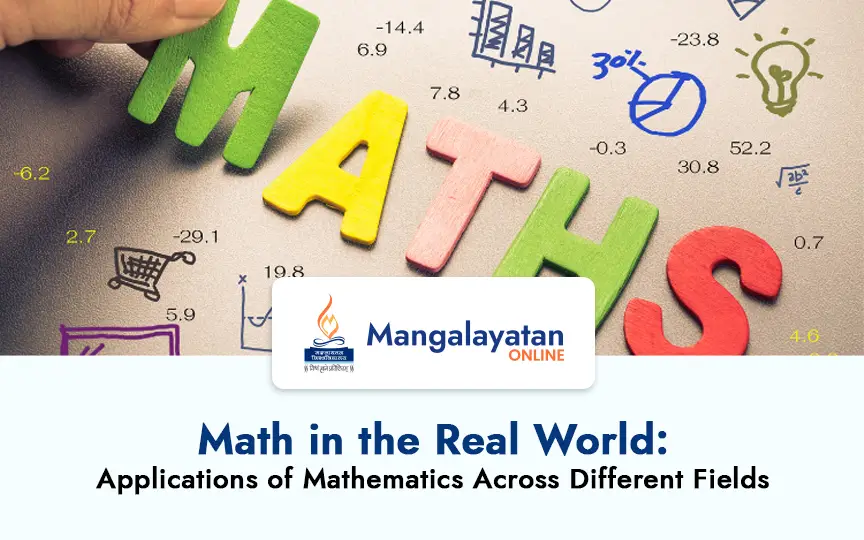In today’s rapidly evolving world, mathematics remains at the heart of numerous fields, from engineering and technology to finance, healthcare, and beyond. If you’re considering advancing your education with an Online Master’s in Mathematics or an Online MSc, you’re setting yourself up for a dynamic career that blends analytical thinking, problem-solving, and innovation. Mathematics isn’t just about numbers; it’s a language that explains the universe, shapes industries, and solves real-world challenges. This blog will explore the practical applications of mathematics across different fields, helping you understand why an MSc in Mathematics is a valuable and versatile degree.
For those considering pursuing an Online Master’s in Mathematics, understanding these applications can provide valuable insights into the potential career paths and research areas available.
Why Pursue an Online MSc in Mathematics?
A Master’s in Mathematics provides more than just advanced knowledge of abstract theories; it equips you with skills that are in high demand across various industries. Whether you’re interested in research, teaching, data science, finance, or technology, a mathematics degree will sharpen your analytical thinking, problem-solving abilities, and precision.
In today’s job market, pursuing an Online MSc offers flexibility, affordability, and access to top-tier education from anywhere in the world. For those considering online programs, the convenience of balancing study with work or other commitments makes this an ideal path.
Real-World Applications of Mathematics
Engineering and Technology
- Structural Engineering: Mathematics, particularly calculus and differential equations, is fundamental in designing structures that can withstand various loads and forces. Engineers use mathematical models to analyze the behavior of bridges, buildings, and other structures under different conditions.
- Computer Science: Algorithms, data structures, and discrete mathematics form the backbone of computer science. Online MSc concepts are used in developing software, designing computer networks, and creating artificial intelligence systems.
- Electrical Engineering: Circuit analysis, signal processing, and control systems rely heavily on mathematical principles. Engineers use differential equations and Fourier analysis to analyze electrical circuits and design communication systems.
Finance and Economics
- Financial Modeling: Quantitative analysts use mathematical models to predict market trends, assess risk, and develop investment strategies. Probability theory, statistics, and calculus are essential tools in this field.
- Actuarial Science: Actuaries use mathematical techniques to assess financial risk in the insurance industry. They calculate insurance premiums, analyze mortality rates, and evaluate investment returns.
- Economics: Economic theories and models are often based on mathematical concepts. Economists use calculus, optimization, and game theory to analyze market behavior, economic growth, and policy implications.
Natural Sciences
- Physics: Online MSc is the language of physics. From classical mechanics to quantum theory, mathematical equations describe the fundamental laws of the universe. Physicists use calculus, differential equations, and linear algebra to model physical phenomena.
- Chemistry: Chemical reactions and properties are often described using mathematical equations. Chemists use calculus, differential equations, and statistics to analyze experimental data and develop new materials.
- Biology: Mathematical models are used to study biological systems, such as population dynamics, genetics, and epidemiology. Biologists use statistics, probability theory, and differential equations to analyze biological data and make predictions.
Other Fields
- Data Science: Mathematics is essential for data analysis, machine learning, and data mining. Data scientists use statistics, linear algebra, and calculus to extract insights from large datasets and make informed decisions.
- Operations Research: Operations researchers use mathematical methods to optimize systems and processes. They apply techniques such as linear programming, queuing theory, and game theory to improve efficiency and decision-making.
- Cryptography: Cryptography, the science of secure communication, relies heavily on mathematical principles. Cryptographers use number theory, algebra, and probability theory to develop encryption algorithms and protect sensitive information.
Benefits of an Online Master’s in Mathematics
For those looking to balance work and study, an Online MSc offers the flexibility needed to pursue advanced education without sacrificing current commitments. These programs are designed to provide the same level of academic rigor as traditional programs, with the added benefit of studying from anywhere.
Online learning allows you to access lectures, resources, and faculty members from top universities, giving you a global perspective on mathematics and its applications. The rise of virtual classrooms has also created collaborative environments where students from around the world can connect, share ideas, and work on real-world problems.
In addition, many online MSc programs offer specialized tracks that allow you to tailor your degree to your career goals. Whether it’s data science, financial mathematics, or pure mathematics, the best programs will equip you with the skills you need to succeed in today’s competitive job market.

Conclusion
Mathematics is a powerful tool with applications across countless industries, and an MSc in Mathematics can open doors to a wide array of career paths. Whether you choose to apply mathematical techniques to data science, finance, engineering, or healthcare, the possibilities are endless. The rise of Online Master in mathematics offers a flexible and accessible way to gain the skills you need to succeed in these fields.
If you’re looking for a degree that combines intellectual challenge with practical applications, consider enrolling in the Best Online Master’s in Mathematics program today. The world of mathematics is vast and versatile, and with advanced education, you’ll be well-equipped to tackle the challenges of tomorrow.
By pursuing an Online Mathematics Masters Degree, you’ll not only deepen your understanding of mathematical theories but also position yourself at the forefront of solving real-world problems. Whether you’re passionate about data science, finance, cryptography, or environmental sustainability, an Online MSc can set the stage for a rewarding and impactful career.







